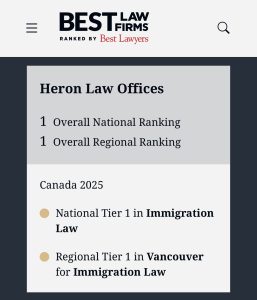They say you can’t believe everything you read on the internet.
By: Jessye Kilburn
April 11, 2023

Let’s say you’re an international student who has been studying hard towards your degree and aiming to get a Post-Graduation Work Permit (PGWP) at the end of your studies. But, as you’re about to graduate, you begin looking into PGWP eligibility and realize that you might not be eligible—the Immigration, Refugees and Citizenship Canada (IRCC) website says you need to have studied full time in all semesters other than your final semester or while on authorized leave. But maybe you were facing health issues, or maybe you had a loss in the family, and you had to take one part time semester in your second or third year. At the time, you were just trying to cope, and you had no idea this part time semester could prevent you from getting a PGWP down the road.
Are you out of luck? Not necessarily.

Image: Wikimedia Commons.
Immigration officers’ discretion in PGWP applications
The official position is that discretion doesn’t exist in PGWP applications. By “discretion”, in this context, I mean leeway for the officer to use their judgement and grant a PGWP if circumstances warrant—even if all of the technical eligibility requirements are not met, such as the requirement to maintain full time studies other than the final semester or an authorized leave.
If you search CanLii, Canada’s online free database of legal decisions, you’ll find many cases from the Federal Court saying that the PGWP eligibility requirements on IRCC’s website are mandatory and must be “strictly applied”. (For example, see the long list of cases cited in Idowu v. Canada (Citizenship and Immigration), 2022 FC 46 at paragraph 17).
But the reality on the ground is that sometimes, as immigration practitioners, we do see students getting PGWPs without meeting mandatory requirements—based on officers’ discretion.
For example, a student may have taken a leave in the middle of their studies, which was unauthorized by their institution, or may have taken part-time studies outside of their last semester. These students may have had very good reasons for these decisions – a change in academic program, limited access to pre-requisite courses, financial issues, a loss in the family, health struggles, the list goes on.
Officially, the online instructions and (most of) the recent case law doesn’t leave room for these kinds of situations – meaning that there’s technically no right to a PGWP if you were not studying full time in all semesters, other than during authorized leave or during your final semester of studies.
Nonetheless, we sometimes see officers granting PGWPs to students in these types of situations, often based on strong submissions requesting discretion and showing – for example – that the student was very close to meeting the technical requirements and that they were experiencing challenging circumstances beyond their control.
What does this mean for applicants?
From an applicant’s or practitioner’s perspective, the implication is clear: ask for discretion if needed, and provide evidence of your intention and efforts to maintain full time student status. There are no guarantees that this will result in you getting a PGWP, but it may at least be worth a try.
Always be mindful of the deadline for PGWP eligibility: “Applicants must apply for a post-graduation work permit (PGWP) within 180 days of obtaining written confirmation, such as an official letter or transcript, from the designated learning institution (DLI) indicating that they have met the requirements for completing their program of study.”
Unfortunately, sometimes students come to us with a PGWP refusal after this 180-day deadline – at which point their options may be limited. (However, there may be the possibility of applying for a Temporary Resident Permit, a topic my colleague Katie Lay will cover in her blog post next week.)
If you’re graduating soon and want to apply for a PGWP, but you’re worried that you might be ineligible, your best option would be to discuss the application with a professional as soon as possible, so that you can put your best foot forward with a request for discretion before the 180 days has expired.
What does this mean in the bigger picture?
This issue deserves a longer analysis at some point, but for now, I’ll say this.
The Federal Court’s role in reviewing immigration decisions is founded in what we call “administrative law”, meaning judges with legal expertise taking a principled approach to reviewing the actions of administrative agencies (e.g. immigration or refugee decisions made by IRCC or the Immigration and Refugee Board).
In law school, we learned that administrative law is fundamentally about ensuring the legitimate exercise of public power by governments. The Supreme Court has written that “administrative decision making [is] one of the principal manifestations of state power in the lives of Canadians”—and of course, I would add, also in the lives of non-Canadians subject to Canadian immigration laws—and that “the exercise of public power must be justified, intelligible and transparent, not in the abstract, but to the individuals subject to it”.
Anyone who has tried to immigrate to Canada, or watched loved ones do so, knows that agencies like IRCC have huge and tangible power over individuals’ lives. Administrative law’s promise is that independent reviewing judges will ensure that power is being exercised reasonably and fairly.
The issue is this: if PGWP discretion exists, but IRCC and the Federal Court say it does not – how do we know the discretion is being exercised reasonably and fairly? How do we know for sure, beyond speculating, what factors are being considered? What if an officer decides to give leeway to one student and not another based on completely arbitrary (or worse, discriminatory) reasons?
In a famous case from the 1950s called Roncarelli v. Duplessis, the Supreme Court of Canada brought down the proverbial hammer on the Premier of Quebec for punitively cancelling someone’s liquor license for illegitimate religious/political reasons. Justice Ivan Rand’s oft-quoted reasons emphasize the importance of the rule of law, even when a government agency is making discretionary decisions. “Discretion”, wrote Justice Rand, “necessarily implies good faith in discharging public duty” and is not “an unlimited arbitrary power exercisable for any purpose, however capricious or irrelevant, regardless of the nature or purpose of the statute”.
I’m not suggesting that immigration officers are intentionally making capricious decisions like in Roncarelli. My issue is that we simply don’t know why, or how, officers are exercising their discretion on PGWP applications.
My suggestion to IRCC would be this: set out some guidelines on discretionary exceptions to PGWP eligibility and what criteria officers ought to apply. This would allow a more open process, where applicants would know how their request for discretion is being assessed, and it would allow the Federal Court to meaningfully review whether discretion is being applied reasonably and fairly.
On a human level, it’s so important that hardworking international students are given a margin of flexibility to take a part time course load when they can show that they’re facing challenging circumstances like a death in the family, mental health struggles, learning disabilities, medical conditions, pregnancy, pre-requisite constraints, or whatever else may come their way – without losing their hard-earned PGWP eligibility.
For further reading: the Canadian Bar Association’s Immigration Section made recommendations to the Minister of Immigration on this topic last fall.




